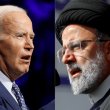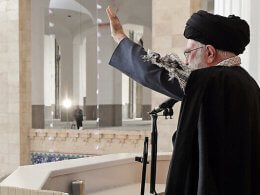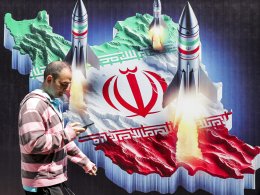By Joel C. Rosenberg | December 1, 2022
Working feverishly to finalize his government coalition and come back to power after 18 months in the opposition, incoming Israeli Prime Minister Benjamin Netanyahu on Wednesday laid out an ambitious regional agenda.
His top priority, Netanyahu said, is neutralizing the Iran nuclear threat and protecting the State of Israel from “annihilation.”
His second priority is forging a peace and normalization treaty with the Kingdom of Saudi Arabia, as part of his larger objective of expanding the circle of Abraham Accords countries.
That said, Netanyahu indicated that his first state visit will be to the United Arab Emirates to meet with President Mohamed bin Zayed al Nahyan – the first Arab leader in a quarter of a century to make peace with Israel – and announce his support of the Abraham Accords in August 2020.
The COVID pandemic and various scheduling problems prevented Netanyahu from making such a state visit to the UAE before he was voted out of power. His successor, then-Prime Minister Naftali Bennett, became the first Israeli premier to formally visit the UAE.
Netanyahu laid out his agenda with the Arab and broader Muslim world during a one hour and seven minute podcast interview with Bari Weiss, a former editorial writer for the New York Times.
During the wide-ranging conversation, Netanyahu praised previous Israeli leaders who had negotiated the region’s first two Arab-Israeli peace accords, then discussed his own role in the Abraham Accords and his vision for the future.
“The more important thing is that we’ve been able to make peace with them [the Arabs],” Netanyahu said. “We’ve been able to make peace with Egypt and Jordan. That was first done by Menachem Begin of the Likud with the late Egyptian President Anwar Sadat and Yitzhak Rabin with King Hussein of Jordan.”
“For 25 years, we could not make peace with any of our other neighbors, but as Iranian power rose and its quest for nuclear weapons surfaced, and as Israel’s power rose and our ability to be viewed, we changed the perception of Arab leaders towards Israel,” Netanyahu continued.
“They no longer viewed us as their enemy but as their ally—I would say their indispensable ally—joining them in fending off the Iranian threat, which is common to both of us,” he said.
“The second is as a potential source of tremendous innovation, technology, water, energy, medicine, business, everything. They saw that as something that could better the lives of their citizens. So for both reasons, we were able to, after a quarter-of-a-century of paralysis, breakout into the Arab world.”
“You have to see this. Hundreds of thousands of Israelis are flying over the skies of Saudi Arabia to Abu Dhabi and to Bahrain and to Dubai. Arabs and Israelis are dancing in the streets there.”
Netanyahu added that, “there is, believe it or not, a ‘Cafe Bibi’ in Dubai, which I intend to visit.”
“My first trip, I decided, will be to the United Arab Emirates, as a signal of my seriousness to expanding the peace.”
Weiss marveled that Netanyahu is not only the longest-serving, democratically elected prime minister in the modern history of the Jewish state but that he has come back to power for the third time after twice being removed by the voters.
“I’ve come back,” Netanyahu agreed. “The question is, what am I coming back for?”
“When I followed the vision of empowering Israel economically and militarily, I also empowered it diplomatically by necessity, because people are attracted to the strong. The strong can be moral or the strong can be immoral. It’s not important. They’re attracted to strength.”
“Martin Luther King said the arc of history bends toward justice. Well, it’s a brittle arc and it can break under the pounding blows of the worst aggressors and tyrants of history. So that’s not guaranteed. It has to be a strong arc.”
“To be a strong arc, you have to be continually strong. I made Israel strong. As a result, I made peace with Arab countries that nobody believed we could make peace with. We made four peace treaties with four Arab countries.”
“If you ask, what is my goal now? The first thing is to prevent Iran from annihilating us. Number one, that’s simple,” he said.
“The second is to expand the circle of peace beyond our imagination,” Netanyahu continued.
“Saudi Arabia would be a tremendous achievement, to have peace with them, because it would effectively end the Arab-Israeli conflict. Not the Palestinian-Israeli conflict. Remember, the Palestinians are one to two percent of the Arab world, but they’re the tail that’s wagging the Arab body. I’ll get there, too, but I think that it’ll be easier to get there if you end the Arab-Israeli conflict and leave that one to two percent. Although, if they’re willing to make peace now, I’ll make peace with them now.”
Can Netanyahu deliver on such promises?
How will the Arab world react to Netanyahu forming a government with far-right parties, some led by figures widely denounced as “extremists,” “racists” and “anti-Arab”?
It’s too early to say, but it’s certainly not going to be easy.
Netanyahu and his advisors are going to need the prayers of millions of Christians around the world to be able to safeguard “the peace of Jerusalem” and expand the circle of peace to Saudi Arabia and beyond.
First, however, he must successfully form a government.
That’s proving to be more difficult than many political analysts expected given the sky-high demands of the far-right parties who are currently demanding much more than Netanyahu seems inclined to give.










